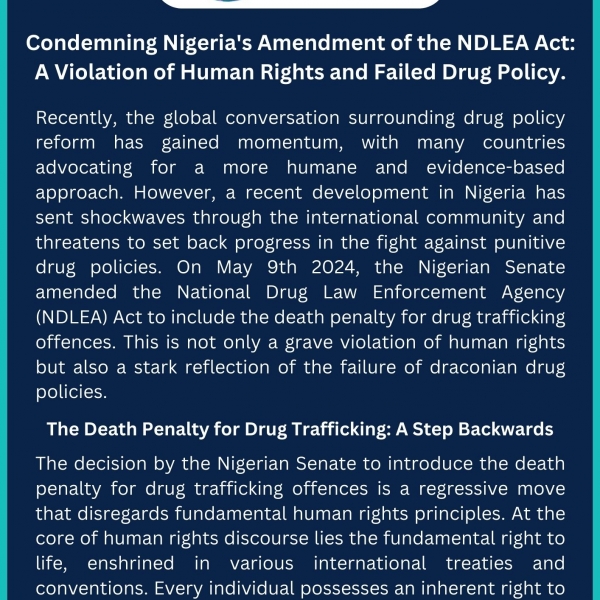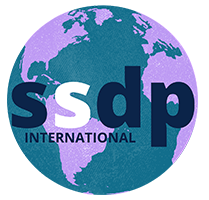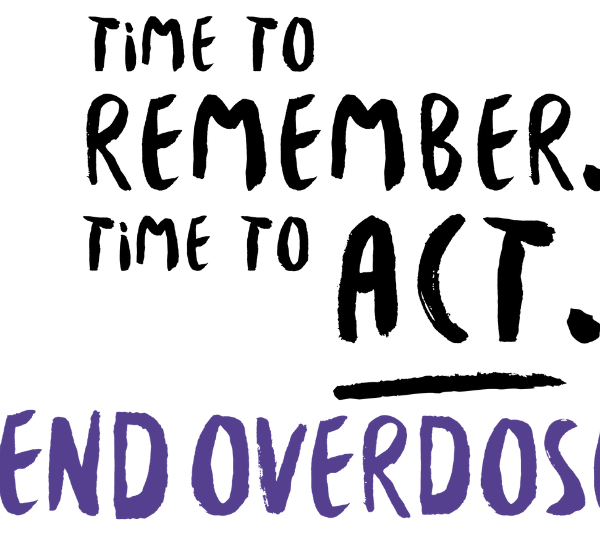Condemning Nigeria's Amendment of the NDLEA Act: A Violation of Human Rights and Failed Drug Policy.

Recently, the global conversation surrounding drug policy reform has gained momentum, with many countries advocating for a more humane and evidence-based approach. However, a recent development in Nigeria has sent shockwaves through the international community and threatens to set back progress in the fight against punitive drug policies. On May 9th 2024, the Nigerian Senate amended the National Drug Law Enforcement Agency (NDLEA) Act to include the death penalty for drug trafficking offences. This is not only a grave violation of human rights but also a stark reflection of the failure of draconian drug policies.
The Death Penalty for Drug Trafficking: A Step Backwards
The decision by the Nigerian Senate to introduce the death penalty for drug trafficking offences is a regressive move that disregards fundamental human rights principles. At the core of human rights discourse lies the fundamental right to life, enshrined in various international treaties and conventions. Every individual possesses an inherent right to life, regardless of the nature of their alleged crimes. The imposition of the death penalty for drug trafficking offences directly contravenes this foundational principle.
Moreover, the severity of the punishment must be proportional to the crime committed. While drug trafficking undoubtedly poses serious societal challenges, resorting to the death penalty represents an excessive and disproportionate response. Additionally, this punishment constitutes cruel, inhuman, or degrading treatment, as condemned by international human rights law. This is highlighted in the United Nations Office of the High Commissioner on Human Rights report on drug policy which states that:
“Human rights mechanisms have consistently called for the abolition of the death penalty for drug-related offences, stressing that it is contrary to international law. During the 2023 Human Rights Council panel discussion on human rights violations relating to the use of the death penalty, experts recalled that crimes not resulting directly and intentionally in death, such as drug-related offences, should never be sanctioned by the death penalty, and stressed that any strategy to combat the death penalty for drug offences must be interwoven with systemic reform of drug policies”
As such, it not only inflicts unnecessary suffering but also fails to address the root causes of drug trafficking, such as poverty, a lack of education, and systemic inequalities.
The use of the death penalty presents significant obstacles to ensuring the right to a fair trial. Guarantees of a fair trial include the right to legal representation, the presumption of innocence, access to evidence, and protection against forced confessions. However, in numerous jurisdictions, such as Nigeria, the criminal justice system is plagued by corruption, inefficiency, and a lack of access to legal representation, casting serious doubt on the fairness of trials that involve capital punishment.
Additionally, the imposition of the death penalty on drug trafficking will disproportionately impact vulnerable populations, including low-level offenders, marginalised communities, and individuals with limited access to legal representation. In many cases, those engaged in drug trafficking are driven by socioeconomic factors such as poverty, a lack of education, or coercion by criminal networks. Sentencing them to death exacerbates their marginalisation and denies them the opportunity for rehabilitation and social reintegration. The devastating impact extends beyond the individuals sentenced; their families suffer immense emotional and psychological distress, often losing a primary breadwinner, which plunges them further into poverty. Children are particularly affected, facing stigma, trauma, and disruptions to their education and development. Communities also feel the strain, as the execution of members erodes social cohesion, fosters distrust in the justice system and perpetuates cycles of violence and criminality. The broader societal impact includes a diversion of resources from more effective crime prevention and rehabilitation programmes to maintaining death row facilities and conducting executions, ultimately undermining efforts to build safer, healthier communities.
Call to Action:
As advocates for sensible drug policy and defenders of human rights, we cannot stand idly by while such a draconian measure is enacted. We call on all members of the international community to join us in condemning Nigeria's decision and urging its government to repeal this inhumane law. We must speak out against the death penalty in all its forms and work together to promote alternative approaches to drug policy that prioritise harm reduction, human rights and social justice.
Here's how you can take action:
- Raise Awareness: Share information about Nigeria's decision and its implications for human rights and drug policy on social media platforms and in your communities. Use #NoToDeathPenalty and #DrugPolicyReform to amplify our message. Despite the gravity of the new enactment, there is a dearth of reportage by mainstream media. Public engagement and awareness campaigns can play a vital role in shaping public opinion towards human rights-centric policies, generating momentum for change.
- Contact your representatives: Write to your elected officials and urge them to condemn Nigeria's approval of the death penalty for drug trafficking. Encourage them to advocate for a repeal of this unjust law and support evidence-based drug policies that proffer sustainable solutions.
- Engage with the NDLEA: Engaging with the NDLEA to repeal the death penalty for drug offenders involves a multifaceted approach focused on fostering understanding, dialogue, and collaboration. It begins by educating NDLEA officials on the shortcomings and human rights concerns associated with the death penalty, highlighting its ineffectiveness as a deterrent and its potential for miscarriages of justice. Collaborative efforts can then explore alternative approaches such as harm reduction and rehabilitation, which prioritise addressing the root causes of drug-related issues and promoting public health over punitive measures.
- Advocating for legal reforms within the NDLEA and broader legal frameworks is crucial and must be supported by evidence-based research and international standards that demonstrate the viability and effectiveness of alternative sentencing options. By emphasising success stories from other jurisdictions where the death penalty for drug offences has been repealed, we can envision a future where punitive measures are replaced with strategies that prioritise compassion, rehabilitation, and harm reduction.
- Engage with International Organisations: Reach out to international human rights organisations, diplomatic missions, and other relevant bodies to seek support and solidarity in condemning Nigeria's decision and advocating for positive change.
- Support Local Initiatives: Stand in solidarity with local activists and organisations in Nigeria who are at the forefront of the fight against the death penalty and advocate for fair and just drug policies Additionally, with the upcoming Global Day of Action on June 26th, the International Drug Policy Consortiums’s Support.Don't.Punish campaign not only unites regions in advocating for drug policy reform but also serves as a powerful vehicle for campaigning against the death penalty. As such, while coordinating efforts across various regions, we could amplify our collective voice to challenge Nigeria’s decision to introduce the death penalty and promote humane, evidence-based policies.
Together, we can make a difference. Let us stand united against injustice and work towards a world where human rights are respected, and all individuals are treated with dignity and compassion.
Contributors:
Grace Mmesomachi Oji
Ewelle S. Williams
Charity Monareng
IDPC (Maria-Goretti Ane-Loglo and Juan Fernandez)




